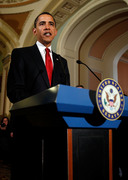 David Broder, the dean of the Washington press corps, notes in his column today that Barack Obama needs the stimulus package to get Republican votes in the Senate if he is to maintain his momentum. Certainly, passing such a huge piece of legislation on a party line vote in both houses of Congress would undercut Obama’s reputation as someone who can bring both sides together and make it hard to see how he could get health-care or other controversial legislation through until after the 2010 mid-terms, when the Democrats are expected to pick up additional seats.
David Broder, the dean of the Washington press corps, notes in his column today that Barack Obama needs the stimulus package to get Republican votes in the Senate if he is to maintain his momentum. Certainly, passing such a huge piece of legislation on a party line vote in both houses of Congress would undercut Obama’s reputation as someone who can bring both sides together and make it hard to see how he could get health-care or other controversial legislation through until after the 2010 mid-terms, when the Democrats are expected to pick up additional seats.
In these circumstances, it is tempting for the Republicans to sit back and simply oppose the stimulus–as Alex says, there’s nothing wrong with oppositions opposing. After all, why should they risk being held responsible for a $800bn plus plan that is badly designed and might not work. But it would be more positive, and would fit the national mood better, if the Republicans were to make it clear that their support will hinge on whether or not Senate Democrats are prepared to improve the bill.
As Matthew Continetti argues in the Weekly Standard, there are stimulus measures—a payroll tax holiday or reduction, increased defence spending and improved transport infrastructure—that Republicans should want. Being the party that gets these measures into the bill would help the Republicans and the country. If the Senate Democratic leadership won’t budge then the Republicans can turn the obstructionist charge back on the Democrats. They can also force the White House to say which version of the bill it prefers–the partisan one or the bi-partisan one.
In advance of the 2010 mid-terms, the Republicans should want to show the electorate that they can work constructively with the president and that more Democrats in Congress is not the answer to America’s problems. If they can do that, the Republicans can hope to stop the bleeding in 2010 and begin the work of reestablishing themselves as a national party.







Comments